Speakers at Women who Empower Summit encourage forging bold paths
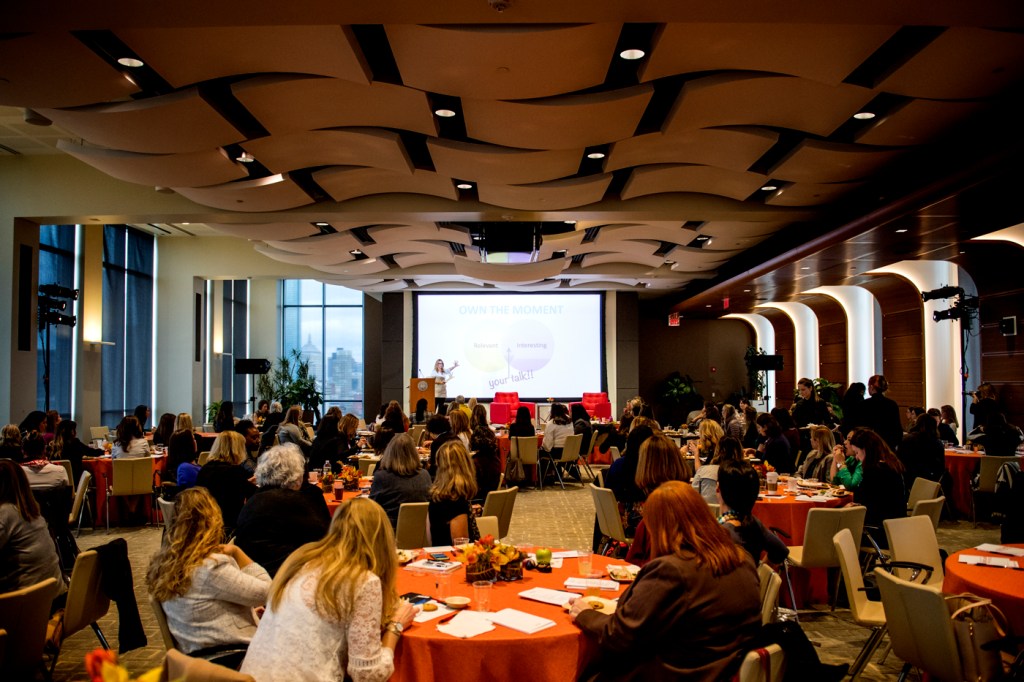
Diane MacGillivray, senior vice president for university advancement, kicked off the second annual Women who Empower Summit on Tuesday by addressing a timely topic that has spurred headlines and a global social media movement: workplace sexual harassment. With people all over the world using the hashtag #metoo to share their stories online, MacGillivray said the movement sheds light on what many women have been facing for far too long.
“It’s so important to share those stories and to say, we will simply no longer tolerate them,” MacGillivray said, speaking to a crowd of women at Northeastern. “It’s also important to insist that we are not defined only by the negative as women.”
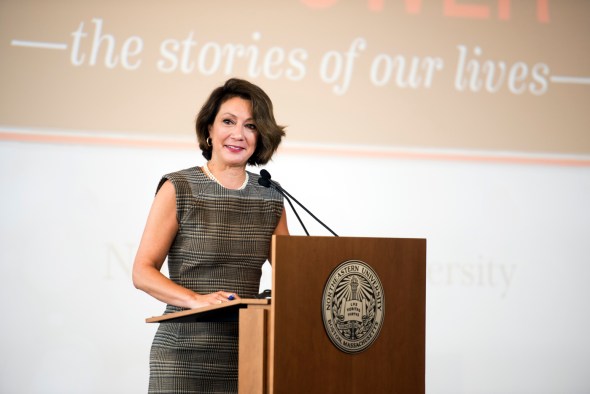
“We are not defined only by the negative as women,” said Diane MacGillivray, senior vice president for university advancement. Photo by Adam Glanzman/Northeastern University
To underscore that point, MacGillivray also recounted a moment that gave her hope and energy—the Women’s March, which took place in cities all over the country after the 2016 presidential election. She had never protested anything before, “But I was out there with so many people, and it was exceptional, extraordinary, exhilarating,” MacGillivray said.
Philomena Mantella, senior vice president and CEO of the Professional Advancement Network at Northeastern, encouraged the crowd to use the summit as an opportunity to grow a supportive and empowered network. “Each of us has a narrative of our journey that gets reshaped as we go,” Mantella said. “Diane and I believe if we strengthen ourselves and our connections, we strengthen Northeastern University.”
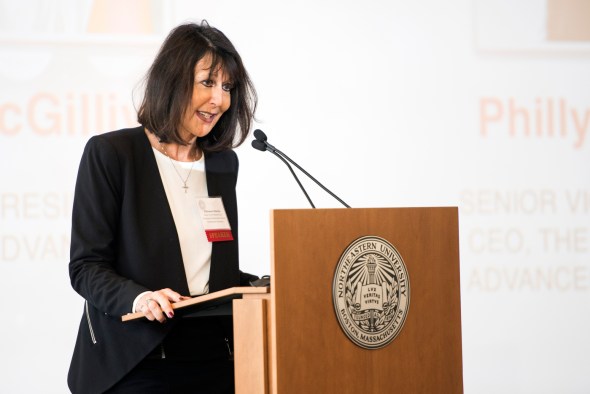
“Each of us has a narrative of our journey that gets reshaped as we go,” said Philomena Mantella, senior vice president and CEO of the Professional Advancement Network at Northeastern. Photo by Adam Glanzman/Northeastern University
The daylong Women who Empower Summit featured a group of speakers from diverse backgrounds and fields who shared a common thread—their paths to success were anything but straightforward. Here are some of the highlights.
‘Imperfections will set you apart’
Kathleen Combes knew she wanted to be a ballerina from age 6. “Not dancing was never an option for me,” she said. She attended an elite boarding school for dance and dedicated every waking moment of her life to the craft, and then at age 17 she tried out for a dance company. After her evaluation, the company leader said that Combes had a body “unsuitable” for classical ballet, and that perhaps she should pursue a different career.
“I was devastated and didn’t know what to do,” Combes said. Instead of giving up, she followed her mom’s advice: “Not everyone is going to like you, not ever, no matter what you do. Never let one person’s opinion dictate your worth.”
“This has been the foundation of my career,” Combes said. Today, she is a principal dancer for the Boston Ballet. She’s learned that, in fact, it’s her imperfections that give her an edge on stage and make her a more interesting dancer. She encouraged audience members to view their own perceived shortcomings in the same fashion.
“Imperfections will set you apart,” Combes said. “Someone will have a problem with it. Just do you, the best you know how.”
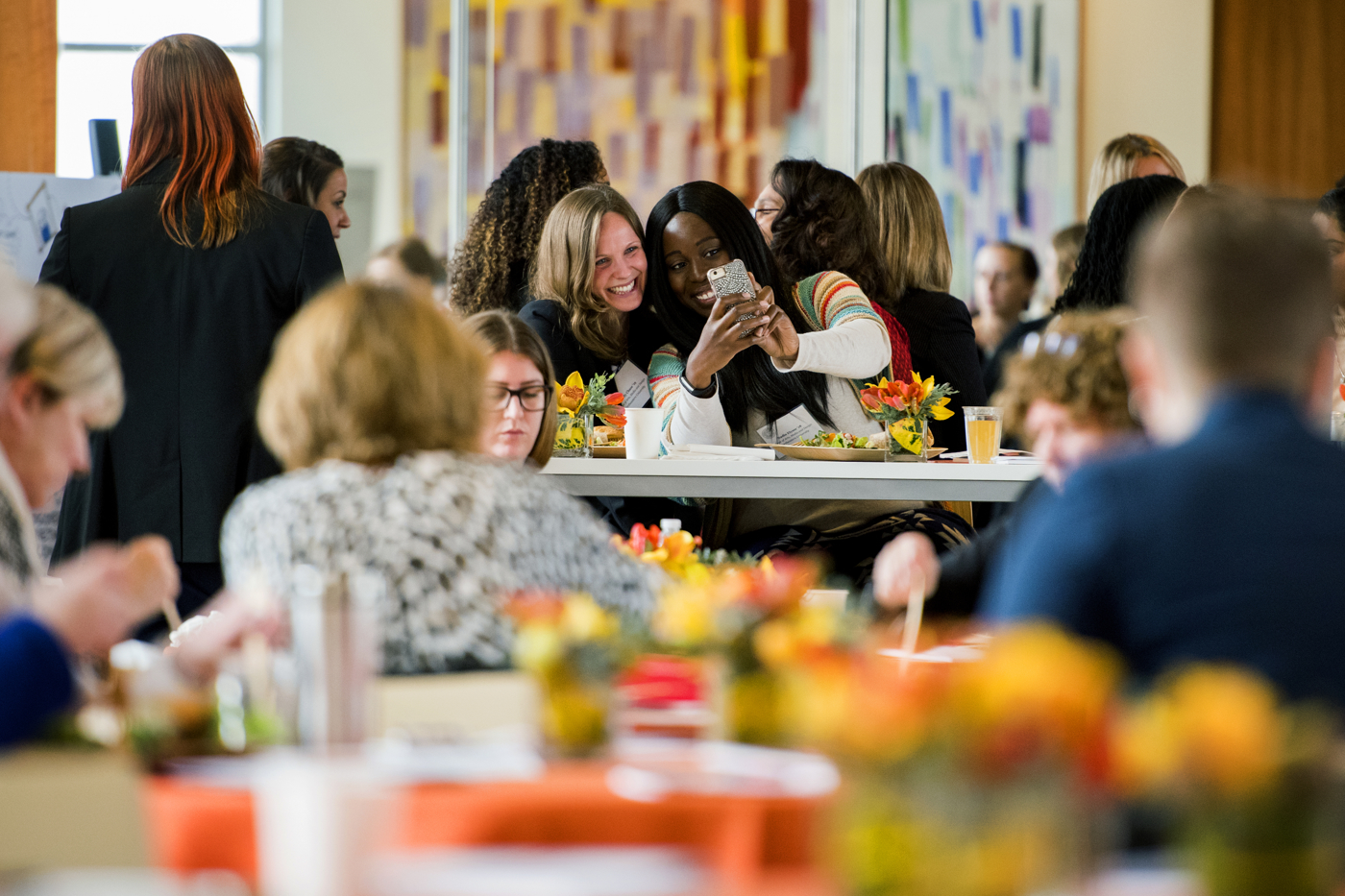
11/07/17 – BOSTON, MA. – Scenes during the Women Who Empower event held on the 17th Floor, East Village on Nov. 7, 2017. Photo by Matthew Modoono/Northeastern University
‘Narrative storytelling changes people’
It took Eve Bridburg a long time—and a lot of diverse experiences—to figure out what she wanted to do with her life. She planted beets on an organic farm. She coded legal documents in a basement. She moved to Prague. She applied to graduate school, was accepted, and decided not to go. “The only constant,” Bridburg said, “was reading veraciously and writing.”
She eventually took a creative fellowship to explore her interest in writing. “The program really did not work for me at all,” Bridburg said. The environment was rigid and unsupportive. She felt unable to be vulnerable or take risks. But the experience inspired her to create something she thought would be better.
Bridburg started GrubStreet as a community writing workshop in Brookline, Massachusetts. What started through word of mouth after she posted flyers around town is now one of the most successful and productive creative writing centers in the country. GrubStreet has provided workshops to more than 30,000 students of varying skill and all genres. She’s watched a high school girl find her voice, a middle-aged CEO find the courage to quit his job and become a full-time entrepreneur, and homeless women find solidarity in sharing their stories for the first time.
“As proud as I am of our success, the thing that has really kept me in it has been seeing that narrative storytelling changes people, how transformative it is,” Bridburg said.
Using art ‘as a way to connect and break down silos’
Silvia Chavez came to Boston from the Dominican Republic 15 years ago—with $300 in her pocket—to attend the Massachusetts College of Art and Design. In one of her first classes, students were assigned to read Shakespeare and write a paper about one of his works. But Chavez was still trying to master English.
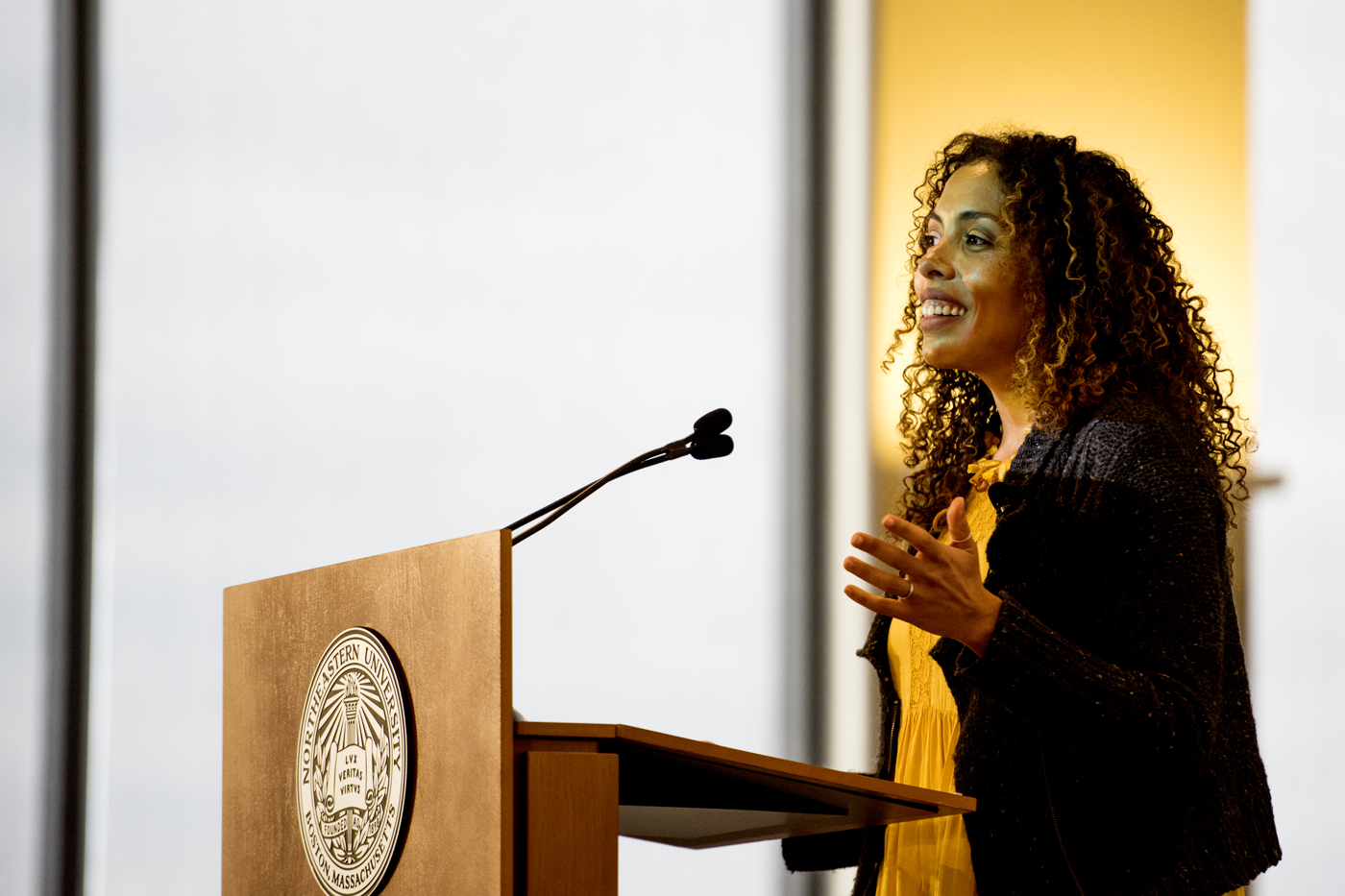
“Art helped me overcome language and social barriers and connect when words could not,” said Silvia López Chavez. Photo by Matthew Modoono/Northeastern University
“I remember coming out of class and going to the bathroom and sobbing,” Chavez said. At a time when it felt like her dream was slipping away, Chavez used art to build resilience. “It helped me overcome language and social barriers and connect when words could not.”
Today, Chavez works in the community, partnering with organizations such as the Boston Medical Center and local schools, using art “as a way to connect and break down silos.” She also leads public art projects, including a large mural she designed along the Charles River Esplanade.
“My goal was to make this space vibrant, bold, and bring this unexpected pop of color,” Chavez said. She completed the project with an all-female crew of assistants who worked together climbing ladders and lugging their supplies to the tunnel that became a canvas. Chavez said people walking or biking by would ask, “Are you an all-woman construction company?”
“It’s hard work, but it doesn’t mean you can’t do it,” Chavez said. “You just have to be smarter about how you do it.”
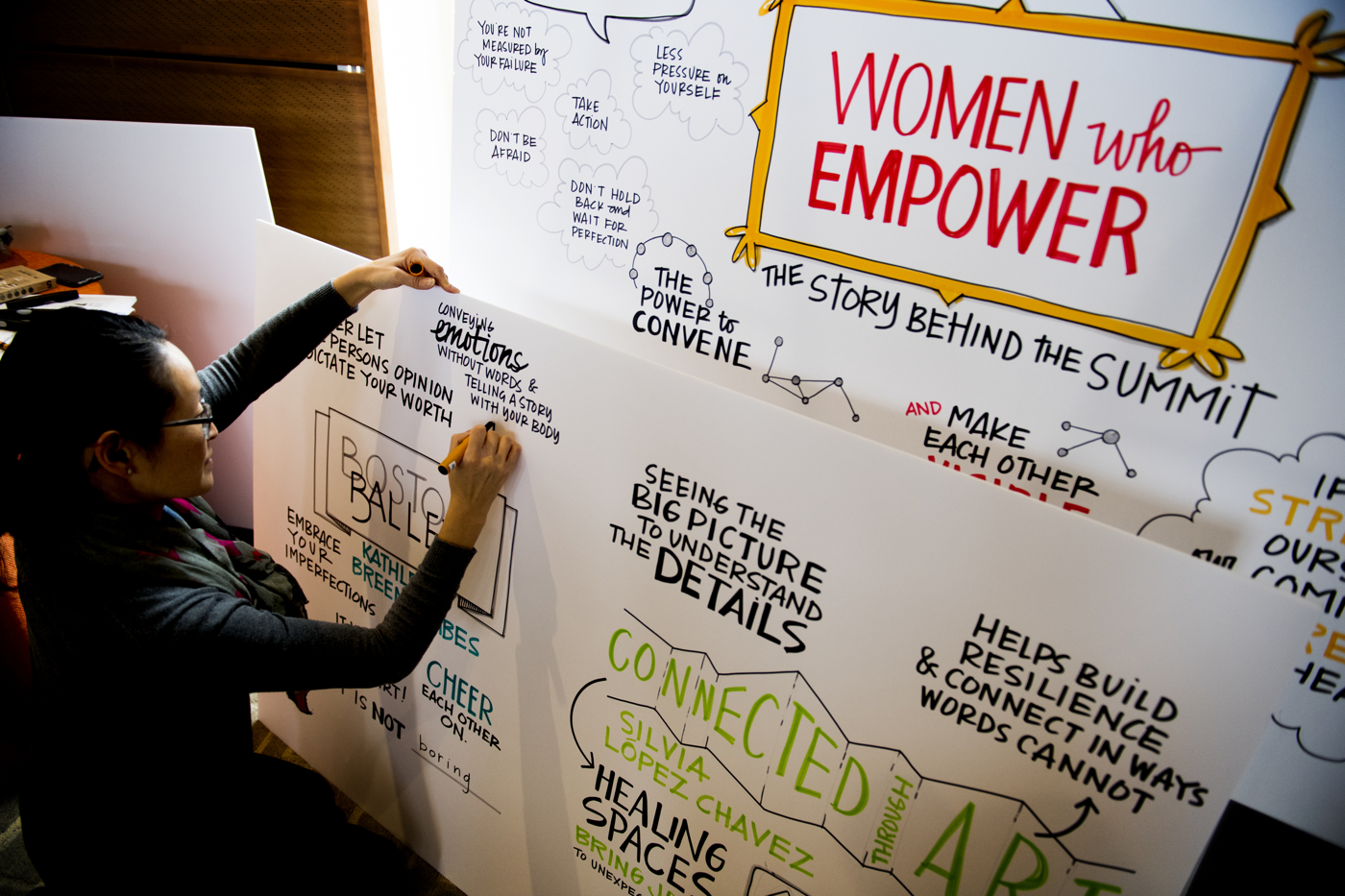
11/07/17 – BOSTON, MA. – Scenes during the Women Who Empower event held on the 17th Floor, East Village on Nov. 7, 2017. Photo by Matthew Modoono/Northeastern University
‘That was the word that changed my life’
Laura Shapiro started her journalistic career in 1969 at an alternative newspaper in Cambridge, Massachusetts. She applied for the editorial assistant position, but was instead offered a job as the classical music critic, despite having no experience in that realm. She was about to turn down the gig, when something compelled her to say “yes” instead. “That was the word that changed my life,” Shapiro said.
Her role evolved to report on new books, theater works, the dance scene, and other facets of the local arts. One day in the office, she stumbled into a meeting in which other journalists were discussing how they should cover the increasing protests and activism coming from the women’s movement. They thought a woman should write the story, but were drawing blanks on who to assign.
“I’ll do it,” Shapiro recalled saying. “That was the second utterance that changed my life.”
From then on, she knew her beat: feminist issues. “For the first time, I felt absolutely at home as a writer.” Her interests evolved over time to focus on women and their often intimate relationship with food. “Every life has a food story,” Shapiro said.





